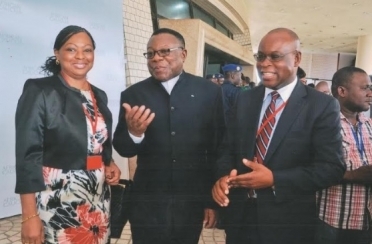
African Governors of the International Monetary Fund (IMF) and the World Bank met in Cotonou, Benin, on 4 and 5 August 2016 for the African Caucus themed on “Scaling up Bretton Woods Institutions Support to address shocks, boost growth and enhance transformation in Africa”. The African Capacity Building Foundation (ACBF) represented by the Executive Secretary, Prof. Emmanuel Nnadozie and Senior Programme Officer, Claude Sinzogan were in attendance at the invitation of Mr Abdoulaye Bio Tchane, Benin’s Senior Minister of Planning and Development and Chairman of the African Caucus.
The meeting provided an opportunity for the ACBF’s Executive Secretary to emphasize on how important capacity is for Africa’s economic transformation and which capacities are required. “Africa’s structural transformation will not occur without addressing the capacity conundrum. Capacity is central to transformation but the gaps are significant,” noted Prof Nnadozie while making his presentation.
He added, “Capacity deficits continue to hobble Africa's development despite notable progress and the invaluable role of ACBF in the past 25 years. Building capacity requires understanding the nature and magnitude of the gaps and needs, as well as devising a strategy for capacity development.” However, he added, capacity development is not well-funded in Africa and even the funding that is available is not necessarily provided or utilized in a way that would generate best results and maximize impact.
He recommended that for the capacity gaps to be addressed, there would be no one-size- fits-all but they could be built by building human capacities; strengthening institutional capacities and enhancing the societal and soft capacities.
The President of the Republic of Benin, His Excellency, Mr Patrice Talon, in his speech emphasized the need to have the African Caucus discussions reflect the aspirations of African people as mentioned in the Sustainable Development Goals (SDG) and in the Agenda 2063.
President Talon recommended that African Governments need to prioritize the mobilization of local resources through sound fiscal reforms and elimination of useless subsidies and unproductive expenses; the need for developed countries to support capacity development in Africa in the area of illicit financing flows; the need to boost the development of African countries through global cooperation to reduce transactions cost in the area of transfer of money; and the need to change the role of Official Development Assistance (ODA) in Africa in order to optimize the potential of local resources.
The “Cotonou Declaration” was adapted at the African Caucus by the African Governors. Amongst other outcomes contained in the Declaration, the African Governors recognised that “the conduct of development policies on the continent prove to be more challenging due to declining commodity prices, tighter financial conditions on capital markets and the multiplicity of shocks of non-economic sources mainly security issues (terrorism) and climate change”.
African Governors also sought customised technical assistance to reinforce capacity building from the Bretton Woods institutions to make African economies more resilient to external shocks, given that public development support should be a leverage to increase the domestic potential of our countries.





